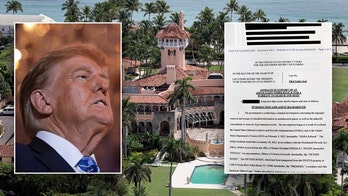Anti-Romney Sentiment Slackens
“Mitt Romney helped create and ran a company that invested in struggling businesses, started new ones, and rebuilt old ones, creating thousands of jobs. Those are the facts.”
-- New ad airing in South Carolina touting Romney’s specific successes at Bain Capital.
With eight days until the South Carolina Republican primary, time is rapidly running out for the conservatives seeking to derail Mitt Romney. South Carolina is their best chance to beat Romney in an early primary, before Republican voters lose interest in any schemes to weaken an inevitable nominee in a tough election year.
In the latest national Gallup poll of the Republican presidential race, the former Massachusetts governor is tied with the collective support for the three Not Romneys, former Pennsylvania Sen. Rick Santorum, former House Speaker Newt Gingrich and Texas Gov. Rick Perry.
The survey, the first big, reliable poll taken that includes any of Romney’s post-New Hampshire boost, shows Romney with 34 percent of the support from Republican registered voters nationally. Santorum took 15 percent, Gingrich 14 percent and Perry 5 percent – an aggregate 34 percent.
Romney’s 34 percent is his best showing in any worthwhile national survey of this election cycle or the previous one. That’s very good news for a guy who was the GOP’s Mr. 25 Percent for most of the past year. And the three-day Gallup poll only contains one day of post-New Hampshire momentum.
But even better news for Romney is that he is now tied with the collective Not Romney vote. In the Gallup survey of a little less than a month ago, Romney trailed the collective Not Romney vote 23 points to 42 points. And that 19-point gap was not the worst of it for the GOP frontrunner.
The previous FOX News poll is pretty indicative of Romney’s experience to this point. That survey, taken Dec. 5 through Dec. 7, showed Romney with 23 points, trailing Gingrich outright by 13 points and lagging the cumulative score of the Not Romneys (which then still included Minnesota Rep. Michele Bachmann) by 30 points.
To rise from a 30 point deficit to a tie in six weeks is pretty good, even with one’s foes hopelessly divided. In the heady days of Bachmannia and the Cain Train, there was such broad anti-Romney sentiment in the GOP that it wasn’t a question of whether Romney would be defeated, but of who would be the champion. Now, the slack has gone out of the line. Romney is stronger after two wins and the collective opposition is weaker.
But South Carolina still tantalizes anti-Romney conservatives. The Real Clear Politics Average for the state still has Romney trailing the collective Not Romney 29 percent to 44 percent. South Carolina, like Iowa, was once thought un-winnable for Romney because of the concentration of religious conservatives and because of his cultural disconnect with Southern voters. Conservatives still believe if they can just get their people to coalesce around one anti-Romney, they might derail the moderate from Massachusetts.
All three of the remaining Not Romneys are socially conservative, favor a smaller federal government than what is currently in place and a more robust military. But they are very different from each other in significant ways.
Santorum’s primary appeal has been to voters who don’t believe Romney’s change of heart on social issues since his 1994 run against Ted Kennedy in Massachusetts. Gingrich’s appeal has been to Southerners (not a bad idea in a party dominated by the South when the frontrunner is from Massachusetts) and to those who think Romney can’t or won’t go hard enough after President Obama. Gingrich is their Georgia Bulldog. Perry’s appeal is for the new, Jacksonian soul of the GOP: working-class whites who feel left out and abused by Washington and Wall Street and think Romney will sell them down the river.
Each candidate is trying to exploit a different Romney weakness, making it even harder for one candidate, even with the blessing of leaders in the conservative movement, to corral the supporters of the other Not Romneys.
Santorum, having bested Gingrich and Perry in Iowa and New Hampshire, seems best situated to win the Not Romney primary. Gingrich and Perry have done serious damage to Romney by lambasting his work at Bain Capital. But both are obviously aware of the damage they are doing to themselves with attacks that sound anti-capitalist from afar. They have both lost support from free-market capitalists put off by their rhetoric. While they have each dialed back their Bain flamethrowers a bit, Gingrich and Perry have no doubt disqualified themselves in the eyes of many in the broadly pro-capitalist GOP.
Santorum, meanwhile, is selling sweater vests and continuing to rally social conservative activists. His hope is pretty clearly that Perry and Gingrich will blow themselves up while trying to stop Romney, and leave Santorum as the last man standing, facing a weakened frontrunner.
“But what about Ron Paul?” you cry. Quite so, Internet, quite so.
Paul’s strong showings in Iowa and New Hampshire, like the success of his son in winning election to the Senate from Kentucky did before, have conferred new legitimacy to Paul’s candidacy.
And, unlike the three Not Romneys, Paul is offering absolute constitutional purity and an unequivocal protest vote against Romney and establishment Republicanism. While Gingrich, Santorum and Perry are arguing that they would be better nominees, Paul is simply making the case that he is the best runner up – the best one to squeeze concessions, appointments and platform planks out of Romney.
Barring an outright upset of Romney in South Carolina (and perhaps even then), it’s hard to imagine any of the three musketeers going the distance. Yes, Santorum or Gingrich might consolidate their status as top Not Romney with a standout second-place finish, but either would head to Florida with low cash reserves and no victories in the first three contests. This would be akin to today winning the title of heir to the throne in the Romanoff dynasty. You become the number one guy who will never take power. Given that unappetizing position, the top Not Romney might only reign for a few weeks before electoral reality forces them to bow out and endorse Romney in order to save face.
Paul, meanwhile, is going to be on every ballot and will contest every caucus and convention. His loyalists combined with protest voters could be significant in low-turnout affairs. This sets up a scenario in which Paul could arrive in Tampa with more than a third of the delegates. For Republicans who detest Paul’s foreign policy, this is most worrisome.
That’s why you can expect to see Paul-averse Republicans fanning the flames of whomever the top Not Romney is in South Carolina in hopes of propping up a mainstream alternative candidate for the next couple of months to soak up delegates, even if Romney is the inevitable nominee.
Then, the last Not Romney would become the first Not Paul. What a weird year.
And Now, A Word From Charles
“But it also seems like eon ago when the debt and deficit and overspending was the overhanging issue. It was, of course, the midterm elections and through last year. The Obama and the Democrats had a counter-narrative about the inequality, the one percent, the Republicans as defenders of the plutocrats who are raping the working class.
Right now that is the story because it's become the story inside the Republican campaign-up. So the old story, the Republican story of debt, overspending, overreaching is now way in the background.”
-- Charles Krauthammer on “Special Report with Bret Baier.”
Chris Stirewalt is digital politics editor for Fox News, and his POWER PLAY column appears Monday-Friday on FoxNews.com.




